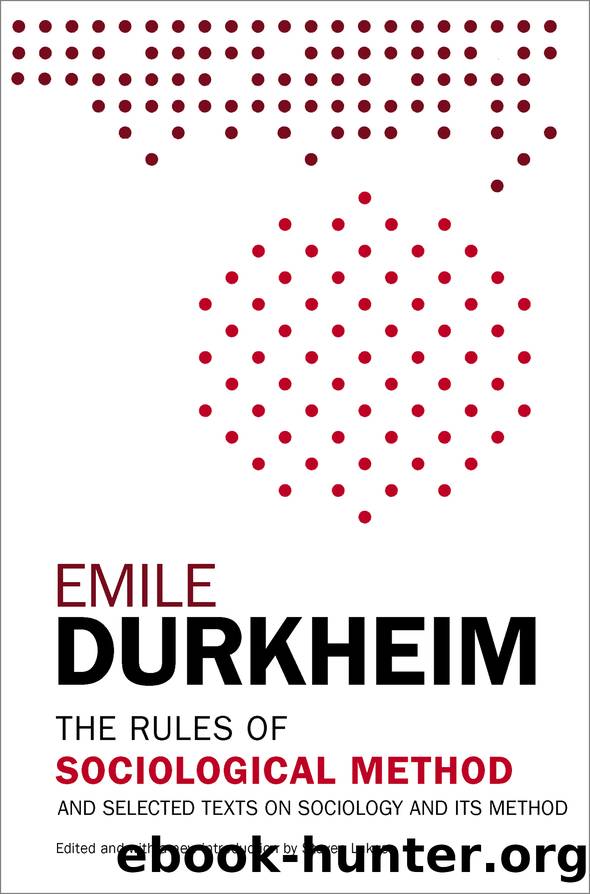The Rules of Sociological Method by Emile Durkheim

Author:Emile Durkheim
Language: eng
Format: epub
Publisher: Free Press
IV
From the set of rules which has just been established, there arises a certain conception of society and collective life.
Two opposing theories divide men on this question.
For some, such as Hobbes and Rousseau, there is a break in continuity between the individual and society. Man is therefore obdurate to the collective life and can only resign himself to it if forced to do so. Social ends are not simply the meeting point for individual ends; they are more likely to run counter to then. Thus, to induce the individual to pursue social ends, constraint must be exercised upon him, and it is in the institution and organization of this constraint that lies the supreme task of society. Yet because the individual is regarded as the sole and unique reality of the human kingdom, this organization, which is designed to constrain and contain him, can only be conceived of as artificial. The organization is not grounded in nature, since it is intended to inflict violence upon him by preventing him from producing anti-social consequences. It is an artifact, a machine wholly constructed by the hands of men and which, like all products of this kind, is only what it is because men have willed it so; an act of volition created it, another one can transform it. Neither Hobbes nor Rousseau appear to have noticed the complete contradiction that exists in admitting that the individual is himself the creator of a machine whose essential role is to exercise domination and constraint over him. Alternatively, it may have seemed to them that, in order to get rid of this contradiction, it was sufficient to conceal it from the eyes of its victims by the skillful device of the social contract.
It is from the opposing idea that the theoreticians of natural law and the economists, and more recently Spencer,22 have drawn their inspiration. For them social life is essentially spontaneous and society is a natural thing. But, if they bestow this characteristic upon it, it is not because they acknowledge it has any specific nature, but because they find a basis for it in the nature of the individual. No more than the two thinkers already mentioned do they see in it a system of things which exists in itself, by virtue of causes peculiar to itself. But while Hobbes and Rousseau only conceived it as a conventional arrangement, with no link at all in reality, which, so to speak, is suspended in air, they in turn state its foundations to be the fundamental instincts of the human heart. Man is naturally inclined to political, domestic and religious life, and to commercial exchanges, etc., and it is from these natural inclinations that social organization is derived. Consequently, wherever it is normal, there is no need to impose it by force. Whenever it resorts to constraint it is because it is not what it ought to be, or because the circumstances are abnormal. In principle, if individual forces are left to develop untrammeled they will organize themselves socially.
Download
This site does not store any files on its server. We only index and link to content provided by other sites. Please contact the content providers to delete copyright contents if any and email us, we'll remove relevant links or contents immediately.
Nudge - Improving Decisions about Health, Wealth, and Happiness by Thaler Sunstein(6633)
iGen by Jean M. Twenge(4702)
The Fire Next Time by James Baldwin(4341)
Adulting by Kelly Williams Brown(3667)
The Sports Rules Book by Human Kinetics(3585)
The Hacking of the American Mind by Robert H. Lustig(3579)
The Ethical Slut by Janet W. Hardy(3500)
Captivate by Vanessa Van Edwards(3295)
Mummy Knew by Lisa James(3166)
In a Sunburned Country by Bill Bryson(2945)
Ants Among Elephants by Sujatha Gidla(2923)
The Worm at the Core by Sheldon Solomon(2916)
Suicide: A Study in Sociology by Emile Durkheim(2609)
The Slow Fix: Solve Problems, Work Smarter, and Live Better In a World Addicted to Speed by Carl Honore(2574)
Humans of New York by Brandon Stanton(2378)
Handbook of Forensic Sociology and Psychology by Stephen J. Morewitz & Mark L. Goldstein(2376)
Blackwell Companion to Sociology, The by Judith R. Blau(2316)
The Happy Hooker by Xaviera Hollander(2273)
Outliers by Malcolm Gladwell(2255)
